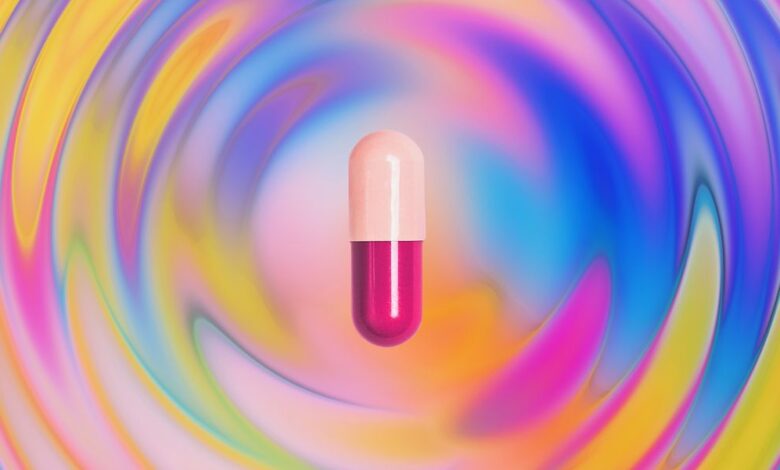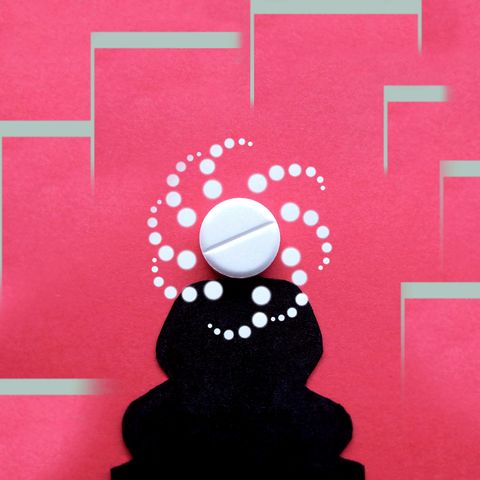Are Ecstasy, LCD, and Other Psychedelic Drugs a Treatment for Depression, Anxiety, PTSD?

In recent years, studies have found that psychedelic drugs can ease intractable depression, end addictions and increase a sense of overall wellbeing and joy. You’d think this would have scientists and drug manufacturers shouting from the rooftops.
But while medical researchers and the subjects of their studies who’ve found relief are quietly hopeful, they also know there may be minefields ahead. That’s because we’re talking about LSD, magic mushrooms and their counterculture kin — substances that have been shunned for more than 50 years, and are still largely illegal.
Psychedelic medicines, which also include peyote, ayahuasca and sometimes also MDMA (a.k.a. the “love drug” ecstasy or Molly), are increasingly being studied in reputable universities for a variety of ills. More than a hundred studies are currently listed on the government’s clinical trials website for psilocybin and LSD, and where it was once hard to recruit people to participate, researchers say folks are eagerly raising their hands.
The reason: studies that have been completed, while preliminary, have been nothing short of amazing. For depression, anxiety, addictions and eating disorders, “people who have suffered for decades have made substantial change after this treatment,” generally after just one to three doses in a supportive setting, says Natalie Gukasyan, M.D., medical director of the Center for Psychedelic and Consciousness Research at Johns Hopkins Bayview Medical Center in Baltimore. And these shifts seem to be lasting.
One woman whose life was changed by psychedelics is Ellen Cox, a general manager at a brewery in Washington, D.C. Cox was a lifelong smoker when, at 47, she signed up to take part in a study at Johns Hopkins. She had smoked a pack a day — first thing in the morning, after meals, with coffee, while driving and before bed — and felt cigarettes were running her life. “My plans always centered around when I would get my next fix,” she says. Cox knew her habit was harming her health and her social life, but every time she tried to quit (she tried patches, gum, medicine and cold turkey) the enticing aroma of someone’s cigarette lured her back. When she learned of the study on social media, she thought it would be fun to legally use psilocybin (the active ingredient in magic mushrooms), but she didn’t have much hope it could help.
As part of the study, Cox underwent three months of psychotherapy, during which she was (among other things) encouraged to focus on how disgusting and detrimental smoking is. Then, in a room with two therapists keeping watch in case of problems, she swallowed the capsule, then slipped on an eye mask and headphones. “It was the most intense experience of my life,” Cox says, adding that the researchers had her listen to a musical playlist that escalated in intensity as the drug’s effects did. “You sort of walk around inside your brain and dive down little rabbit holes.”
Cox’s visions were vivid, such as a colorful room filled with myriad doors, with each one she opened bringing pleasant memories going back to her college days. The session invoked a range of emotions, from curiosity to joy to a brief bout of paranoia. Cox doesn’t recall thoughts about smoking during her mental romp, but when she finished and tried to take a drag, it smelled and tasted awful. She stubbed out the cigarette, and in the past three years she’s never yearned for another. Such dramatic results don’t happen to everyone, but a majority of smokers in her study did quit.
What Happens in the Mind
Every person has a different experience during a psychedelic therapy session, which many find challenging to put into words because so much happens at once, says Matthew Johnson, Ph.D., professor of psychiatry and behavioral sciences at John Hopkins Medicine and associate director of the center, where Cox went. Studies have found the drugs change what you see and hear, your spatial awareness, and your perception of time. Many have insightful visions. “A cancer patient with substantial depression saw this desolate landscape where she was digging and digging. Eventually she found a brilliant jewel, which she viewed as a metaphor that her cancer had covered up her joy in life but there was still beauty at its core,” Johnson says. (Participants remain aware their visions are projections of their own mind, which is why researchers avoid the term hallucinogens to describe the drugs.)
More studies are needed to fully understand how they work their magic, but scientists are learning some things from scans and other tests. For one, psychedelics (with the exception of MDMA) lock onto serotonin receptors in the brain known as 5-HT2A (more specific than those targeted by antidepressant medicines such as selective serotonin reuptake inhibitors). This causes brain networks to shift their usual actions, says Jacob Scott Aday, Ph.D., a post-doctoral researcher at the University of California, San Francisco. “Areas that usually don’t talk to one other are suddenly communicating,” he explains. Psychedelics also seem to dampen brain regions known as the default mode network that in part help maintain our sense of self.
This could explain why people relax long-held beliefs and are open to new ways of thinking about themselves and their problems. “Psychedelic therapy can be such a dramatic experience, akin to a major life event like visiting another culture or falling in love,” Johnson says. He says psychedelic therapy is more similar to psychotherapy than it is to most psychiatric medicines. As a treatment for addiction, for example, pharmaceuticals act as a substitute for the desired substance, blunting withdrawal. But psychedelics provoke self-reflection, which is what psychotherapy aims to do, he says.
That’s what happened for Kelsey Ramsden, a 44-year-old entrepreneur in Vancouver, Canada. Five years ago Ramsden felt hollow and depressed, even though she was an award-winning businesswoman with a wonderful husband and kids. She was already in psychotherapy and taking antidepressants, but she felt she needed more. Ramsden spent two years researching psychedelic therapy — reading articles, talking to experts, and conferring with several business colleagues who had done it — until she finally felt comfortable giving it a try.
In a room with a psychiatrist and a psychologist (the professionals stay quiet, but are there to comfort you if needed), Ramsden viewed a brilliant kaleidoscope of colors. At some point she began seeing situations in her past as if they were movies on a screen, without judgment, and from the perspective of both herself and the others. “It was transformative. I could see that those who’d hurt me were hurting themselves,” Ramsden recalls. Over the next year she had two more sessions with psychotherapy in between. She credits the experience with changing her life. Her self-esteem has soared and relations with extended family are vastly improved. Her 14-year-old daughter points out that Ramsden yells less and is more fully present. “I call it mental wealth. My depth of emotional resources used to be shallow, and now it’s so much deeper,” Ramsden says. The experience was so profound that she quit her job to become president and CEO of a company, Mindcure, that in part researches psychedelic molecules in anticipation of the day the drugs become widely legal.
This content is imported from {embed-name}. You may be able to find the same content in another format, or you may be able to find more information, at their web site.
A Growing Range of Studies
Studies on LSD and other psychedelics actually got their start in the 1950s, and more than a thousand clinical papers were written over a 15-year period. Although most were not the rigorous clinical trials researchers consider ideal, they offered a glimpse into the drugs’ possibilities. But when the hippies of the 1960s began using psychedelics recreationally and proponents like Harvard professor Timothy Leary urged students to down LSD and “turn on, tune in, and drop out,” society turned against the meds. Congress passed the Controlled Substances Act in 1970, which made the drugs not only illegal but difficult to research. Large numbers of scientists only turned to them again after 2006, when an expert at Johns Hopkins published a high-quality study in the journal Psychopharmacology, giving 36 healthy people psilocybin in a supportive environment after which they reported positive changes in attitude and behaviors. These were still being experienced, even 14 months later, a follow-up paper found.
Today, major universities in addition to Johns Hopkins have open dedicated research centers, including New York University and the University of California, Berkeley. (Most study psilocybin, because it can be manufactured in a lab and because, unlike LSD, sessions last 4 to 6 hours rather than 10 to 12.) Psychedelics were given another boost in 2018 when journalist Michael Pollan published the bestseller How to Change Your Mind, describing the research and Pollan’s own experiences. That same year the Food and Drug Administration granted “breakthrough therapy” status to psilocybin for treatment-resistant depression, a designation that speeds testing. “I think a psychedelic will be approved by the FDA within the next several years,” Johnson believes, assuming research continues to show positive results.
Psychedelics are currently being studied for a number of conditions, including:
- Depression and anxiety. Johns Hopkins published results in JAMA Psychiatry last year, where more than half the 24 people with major depression who had two psilocybin sessions (along with supportive psychotherapy) were in remission a month later. Published findings on long-term outcomes from this study are forthcoming and “one-year results are also looking promising,” Dr. Gukasyan says. When British researchers compared two psilocybin treatments to a daily regimen of the antidepressant Lexapro, the psychedelic worked just as well. Even patients facing life-threatening disease have been helped emotionally. New York University researchers found 60% of cancer patients who used psilocybin in their study banished depression even four years after the experience.
- Post traumatic stress disorder. When California researchers compared MDMA and talk therapy with the therapy alone in a study of 90 people, the combo won out. Two months after treatment, two-thirds of the MDMA group no longer had PTSD symptoms, compared to only one third of the others.
- Smoking, alcohol or opioid addiction. When 15 smokers took psilocybin two or three times along with cognitive behavioral therapy, 60% had dropped the habit 30 months later. “Most people see a substantial reduction in cravings. And the emotional aspects of withdrawal — the irritability, fear, depression — seem to be better,” Johnson says of his research.
- Headaches. Yale has begun investigating whether psychedelics might diminish migraines and cluster headaches.
- Anorexia. Dr. Gukasyan and her colleagues have only treated a few people so far, but the results have been promising. “It’s hard to imagine that somebody who might have been struggling for decades could improve dramatically, but in some cases that is what we’ve seen,” she says.
Even healthy people may feel better when they use a psychedelics under controlled conditions. Anxiety decreased and positive affect increased a month after a dozen people took psilocybin in a controlled laboratory setting. A small group of people taking LSD similarly reported an increase in optimism, British researchers found. And a review Aday published last year found many who’ve tried psilocybin say they feel more connected, more spiritual and emotionally upbeat.
Don’t Try This at Home
Experts are excited about their potential, but they caution against using these drugs at parties, concerts, or even at home — acts in the 1960s that sometimes sent people to the emergency room when the trip turned bad. “We invest a lot of time in developing a rapport with participants and helping them feel safe going into their psilocybin experience,” Dr. Gukasyan says.
Even in a controlled setting, people may get anxious or paranoid for part of their session. Those most likely to tend to have personalities where they are less open or accepting, Aday has found. Most at risk to experiencing adverse effects: people with a family or personal history of bipolar disorder or schizophrenia, which is why researchers are excluding them from studies, at least for now.
Taking precautions can reduce the odds of trouble, Johnson says, including being prepared for what to expect, having trained therapists remain, and returning the following day to process thoughts and feelings. This matters a lot, because the effects of these drug are greatly impacted by a person’s expectations and environment.
Of course, it’s illegal to take these drugs outside of clinical trials — at least for now. Federal and state laws ban psychedelics, the exception being for members of Native American tribes or certain religions that use them ceremoniously. But last year Oregon became the first state to legalize psilocybin in therapeutic settings (after the state sets up rules), while cities like Oakland, California, Denver, and, most recently, Washington, D.C., have decriminalized their use.
Ellen Cox looks forward to the day when others can share in the benefits she got from a psychedelic. After all those years struggling to stop her habit, it happened in one thrilling day. Cox no longer coughs or feels short of breath, and doesn’t run her life by her smoking schedule. And she’s saving money to boot. “I used to spend $350 a month on cigarettes,” she says. “I used that money to buy myself a new car.”
This content is created and maintained by a third party, and imported onto this page to help users provide their email addresses. You may be able to find more information about this and similar content at piano.io





